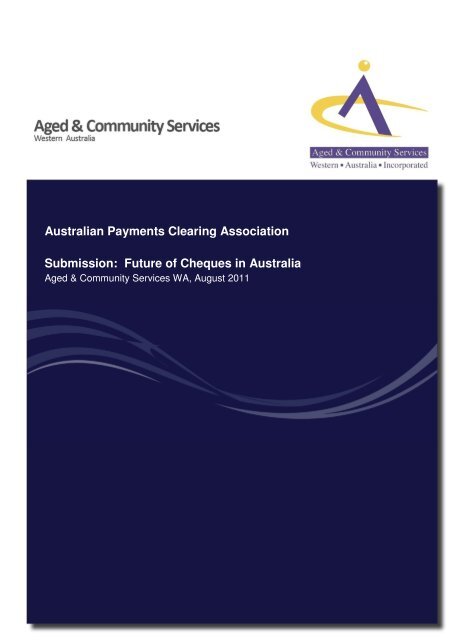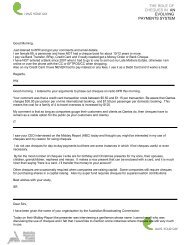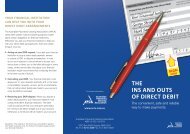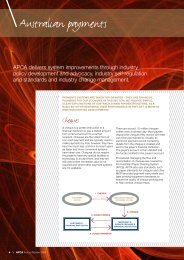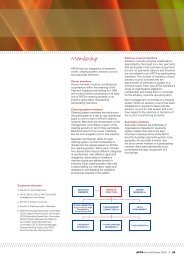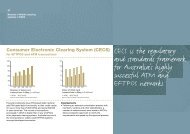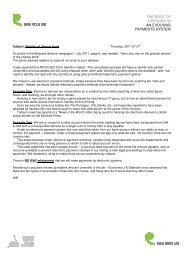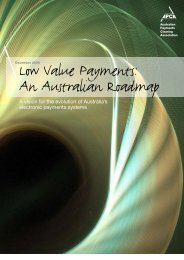acswa - Australian Payments Clearing Association
acswa - Australian Payments Clearing Association
acswa - Australian Payments Clearing Association
- No tags were found...
Create successful ePaper yourself
Turn your PDF publications into a flip-book with our unique Google optimized e-Paper software.
<strong>Australian</strong> <strong>Payments</strong> <strong>Clearing</strong> <strong>Association</strong>Submission: Future of Cheques in AustraliaAged & Community Services WA, August 2011Page | 1
Future Direction of Cheques in Australia Public ConsultationAged & Community Services Western Australia - August 2011Stephen Kobelke, Chief Executive OfficerIntroductionAged & Community Services Western Australia (ACSWA) is the peak body representing over 194 not-forprofitorganisations, providing residential and community care plus hostel and independent living units acrossWA. ACSWA is a member of the national body, Aged & Community Services Australia who collectivelyrepresents over 1,100 church and charitable and community-based organisations providing accommodationand care services to over 700,000 older people, people with a disability and their carers.As at June 2010 about 14% of our population is over 65 years; by 2030 this is anticipated to grow to over20%. By 2020 we will need 82,000 new aged care beds, adding to the current 190,000 beds, as well asmore community care services. Currently about 1 million older people use community care services. By2020 this figure will grow to over 1.4 million – an increase of about 30%.This considerable demographic change must be acknowledged in the public consultation and should beconsidered in any decision around the future of cheques in Australia. It is imperative to ensure that secureand effective payments options continue to be available to this vulnerable sector of the community and thatthe elderly community’s payment needs continue to be met.It is our view that cheques will play an important part for the aged population at least through to 2025 andperhaps onwards.Issues of Concern for ClientsMultiple large Non Government Organisations have provided statistical data to verify current paymentsmethods utilised by their clients. For the financial period April – June 2011 one large providerreceived 1,859 payments for invoices. In the breakdown of payment methods, payment by chequewas the overwhelming choice of clients/ carers (44.11% or 820 transactions). BPay accounted for25.87% (481 transactions) and Electronic Funds Transfer 17.7% (329 transactions). The majority ofother Service Providers stated that approximately 22% of clients paid by cheques. This is especiallyvital for organisations that require payment at the point of service i.e. home maintenance or gardeningservices.There has been consensus amongst Service Providers consulted in this matter that frail aged clientsin particular have a lack of confidence in payment methods other than cheque. Clients that may havecognitive, mobility or literacy issues, sensory difficulties or dual diagnosis of a physical and mentalhealth issues have this compounded difficulty. Concerns exist regarding remembering of passwordsand codes, and concerns over personal safety when providing financial details over the phone tostrangers.Clients that have limited access to public transport or formal and informal support networks wouldhave notable increases in daily living costs to pay for additional transport needs via taxi’s to present ata Bank for assistance with other payment methods.The Wellness Approach in Home and community Care Services is a philosophical change in thethinking behind and delivery of services in Western Australia. The Wellness Approach involvesredesigning the model of service delivery in community care, starting from the premise that people thatare frail or disabled have the capacity to continue to live autonomously and independently in thecommunity if positively supported to do so. Essentially a Wellness Approach is a shift away from adependency model, thereby supporting them to continue to do as much as appropriate for themselves.Many clients’ currently utilising cheque payment methods have got the potential to lose confidence intheir ability to manage their own financial affairs and become more dependent of others for assistancein this area of their life. This goes against the philosophy of supporting the client to keep doing thatthey do well.Page | 2


